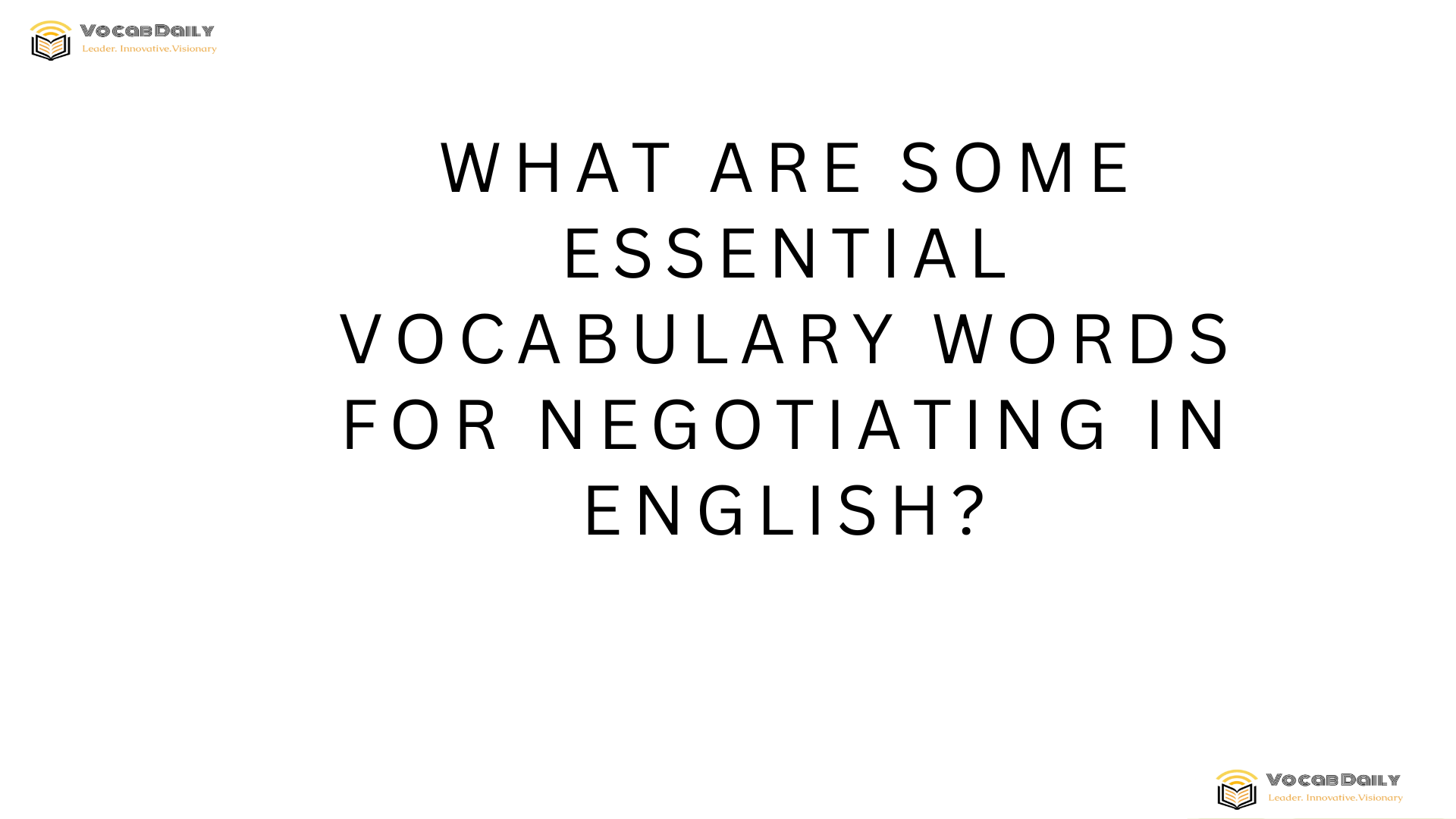The Importance of Negotiation Vocabulary in Professional Settings
Negotiating is a key skill in any professional environment. Whether you are discussing contract terms, job offers, project deadlines, or partnership agreements, using the right vocabulary can significantly improve your communication and outcomes. In English, specific words and phrases help clarify intent, build rapport, and facilitate agreement. Mastering these essential vocabulary words is a step toward becoming a confident negotiator, especially in international or multicultural business settings.
Common Vocabulary Words Used in Negotiations
Understanding and using precise negotiation vocabulary equips you to express proposals, counteroffers, and concerns clearly. Here is a list of common terms frequently used during negotiation processes:
- Proposal: An offer or plan put forward for consideration or discussion.
- Counteroffer: A return offer made in response to a proposal, usually suggesting different terms.
- Bargain: To negotiate the terms of an agreement, often involving price or conditions.
- Concession: Something given up or agreed to in order to reach an agreement.
- Terms and Conditions: The specific details and rules that must be met for an agreement to be valid.
- Agreement: A mutual understanding or contract between parties.
- Compromise: A solution where each party makes concessions to reach a mutually acceptable outcome.
- Leverage: The advantage or power one party uses to influence the other side.
- Stakeholder: A person or organization with interest or concern in a negotiation or project.
- Settlement: The resolution or conclusion reached at the end of negotiation.
Key Phrases for Making Offers and Counteroffers
Using clear phrases to propose or respond during negotiations helps ensure your intentions are understood. Here are some essential phrases to use when making offers or counteroffers:
- “We would like to propose…”
- “Our initial offer is…”
- “Can we adjust the terms to include…”
- “In response to your offer, we would suggest…”
- “Would you consider a counteroffer of…”
- “Let’s explore alternative options for…”
- “We are willing to compromise if…”
- “Could we negotiate on the price/delivery timeline?”
- “How about we settle on…”
- “I’m afraid that proposal doesn’t meet our requirements.”
Vocabulary for Expressing Agreement and Disagreement
Negotiations often involve delicate language, especially when agreeing or disagreeing. Diplomacy in word choice helps maintain positive relationships. Consider these words and expressions:
- Agree: Accept, approve, consent, acknowledge, endorse
- Disagree: Object, oppose, reject, raise concerns, question
- “I agree with your point about…”
- “While I understand your perspective, I must object to…”
- “That is a valid point; however…”
- “We cannot accept the current terms as they stand.”
- “I’m open to discussing alternatives if…”
Words to Describe Negotiation Outcomes
Being able to describe the results of a negotiation accurately is important for documenting and communicating final decisions. Here are key terms related to negotiation outcomes:
- Breakthrough: A significant progress point or successful resolution.
- Deadlock or impasse: A situation where negotiations are stalled with no agreement.
- Win-win: A result in which all parties benefit.
- Compromise: A partial win where parties make concessions.
- Stalemate: A standstill from which neither party can advance the negotiation.
- Consensus: General agreement among all parties.
- Contract: A legally binding agreement reached after negotiation.
- Settlement: The formal conclusion or resolution of a dispute or negotiation.
Words Related to Negotiation Strategies
Knowing strategic terminology can empower negotiators to plan and execute discussions effectively. Here are some important vocabulary words connected to negotiation strategies:
- Baton technique: Passing negotiation control between parties.
- BATNA (Best Alternative to a Negotiated Agreement): The fallback option if negotiations fail.
- Highball/Lowball: Starting with an initially high or low offer to sway negotiations.
- Anchoring: Setting a reference point for negotiations by offering a first number or condition.
- Win-win approach: Strategy aiming for mutual benefit.
- Hardball tactics: Aggressive or demanding negotiation style.
- Collaborative negotiation: A cooperative and problem-solving approach.
Polite Expressions to Maintain Professionalism
Maintaining politeness and professionalism is crucial in negotiations. Using courteous language can help preserve relationships even when disagreements arise. Some polite expressions include:
- “Thank you for your proposal.”
- “I appreciate your perspective.”
- “Could we possibly revisit this section?”
- “With all due respect, I believe…”
- “May I suggest an alternative approach?”
- “Let’s keep an open mind on this issue.”
- “I look forward to finding a solution that works for both sides.”
- “Please let me know if you have any questions.”
Tips for Using Negotiation Vocabulary Effectively
Mastering negotiation vocabulary goes beyond memorizing words. Consider these tips to use the vocabulary effectively in professional settings:
- Understand context: Choose words appropriate to the formality and tone of the negotiation.
- Be clear: Avoid ambiguous language to prevent misunderstandings.
- Practice active listening: Pay attention to the opposing party’s language to respond appropriately.
- Use polite language: Even when disagreeing, use respectful phrases to maintain positive rapport.
- Prepare key vocabulary in advance: Anticipate discussion topics and relevant terms.
- Confirm understanding: Paraphrase or summarize using negotiation vocabulary to ensure clarity.
Enhance Your English Negotiation Skills
Negotiating in English as a second language can be challenging, but expanding your vocabulary in this area will help you communicate confidently. Regularly reviewing and practicing negotiation vocabulary will improve both comprehension and speaking fluency. Role-playing negotiations with colleagues or language partners is a helpful way to apply new words in realistic scenarios. Additionally, reading business news, case studies, and negotiation guides in English will expose you to more advanced and varied vocabulary in context.
By focusing on essential vocabulary words and phrases specifically for negotiating, you demonstrate professionalism and readiness to engage in effective business discussions. Enhancing these skills will bring positive results whether you are negotiating salaries, contracts, partnerships, or project details.
Also check out VocabDaily workbook collections.

Leave a Reply